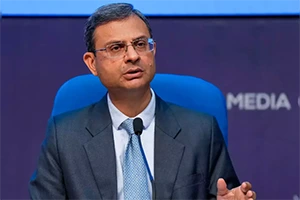 In an interview with the news agency Reuters, India’s Revenue Secretary Sanjay Malhotra claimed that the Indian Government’s current expectations point to Rs 140 billion (roughly $1.7 billion) being generated in tax money by FY25 thanks to the new goods and services tax (GST). The law that resulted in this levy’s implementation came into effect last October, and it dictates that remote gambling operators need to pay a 28% tax on profits generated from each wager made by a client.
In an interview with the news agency Reuters, India’s Revenue Secretary Sanjay Malhotra claimed that the Indian Government’s current expectations point to Rs 140 billion (roughly $1.7 billion) being generated in tax money by FY25 thanks to the new goods and services tax (GST). The law that resulted in this levy’s implementation came into effect last October, and it dictates that remote gambling operators need to pay a 28% tax on profits generated from each wager made by a client.
According to Malhotra, the said levy allowed the Indian Government to collect Rs 35 billion in tax money for the last financial quarter of 2023, and the fiscal year figure that will be recorded in March is predicted to stand at Rs 75 billion. In contrast, last year’s collected funds for the same period were a mere Rs 16 billion, marking an increase of almost Rs 60 billion.
Malhotra claimed that although India’s iGaming industry is currently stable, “it is early to make conclusive remarks.” He continued, pointing out that the tax’s framework will be further reviewed by April, although he did stress that this does not suggest that any updates will be made to the tax rates. Malhotra also told Reuters that the monthly funds generated from the gambling levy have been an average of Rs 1.7 trillion, and that the Government is anticipating the money accumulated to fall between Rs 1.80 trillion and Rs 1.85 trillion starting the fiscal year to follow.
The GST’s Success and Past Major Concerns of the Indian iGaming Industry
 Although the goods and services tax has been a resounding success for the Indian Government, the years and months leading up to its implementation were marked by uncertainty and concerns from industry players. In fact, Gaurav Gaggar, Poker High Promoter, even went as far as to say that the Government had “killed the multibillion-dollar industry with a single stroke” in an interview with the BBC.
Although the goods and services tax has been a resounding success for the Indian Government, the years and months leading up to its implementation were marked by uncertainty and concerns from industry players. In fact, Gaurav Gaggar, Poker High Promoter, even went as far as to say that the Government had “killed the multibillion-dollar industry with a single stroke” in an interview with the BBC.
July 2023 saw more than 120 gambling companies that operate in the Indian online gaming sphere write an open letter to India’s finance minister after the Government reaffirmed its decision to go forward with the tax. In the letter, they called for the Government to reconsider the levy’s then planned implementation. These businesses’ concerns ranged from the closure of legitimate companies to the flourishing of illegal gambling. In relation to the latter, gambling companies expressed concerns that the businesses of non-licensed websites that target India-based gamblers would be fueled by players turning to such operators due to the levy. Another major issue that businesses cited in their letter was that of investors’ potential hesitance to invest in India’s remote gambling sector as a result of the goods and services tax.
Contrary to the fears outlined above, Malhotra’s remark on the industry’s stability suggests that, for now, most of the concerns were not ultimately realized. Whether such problems might emerge in the future and cause long-term issues is yet to be known, however.